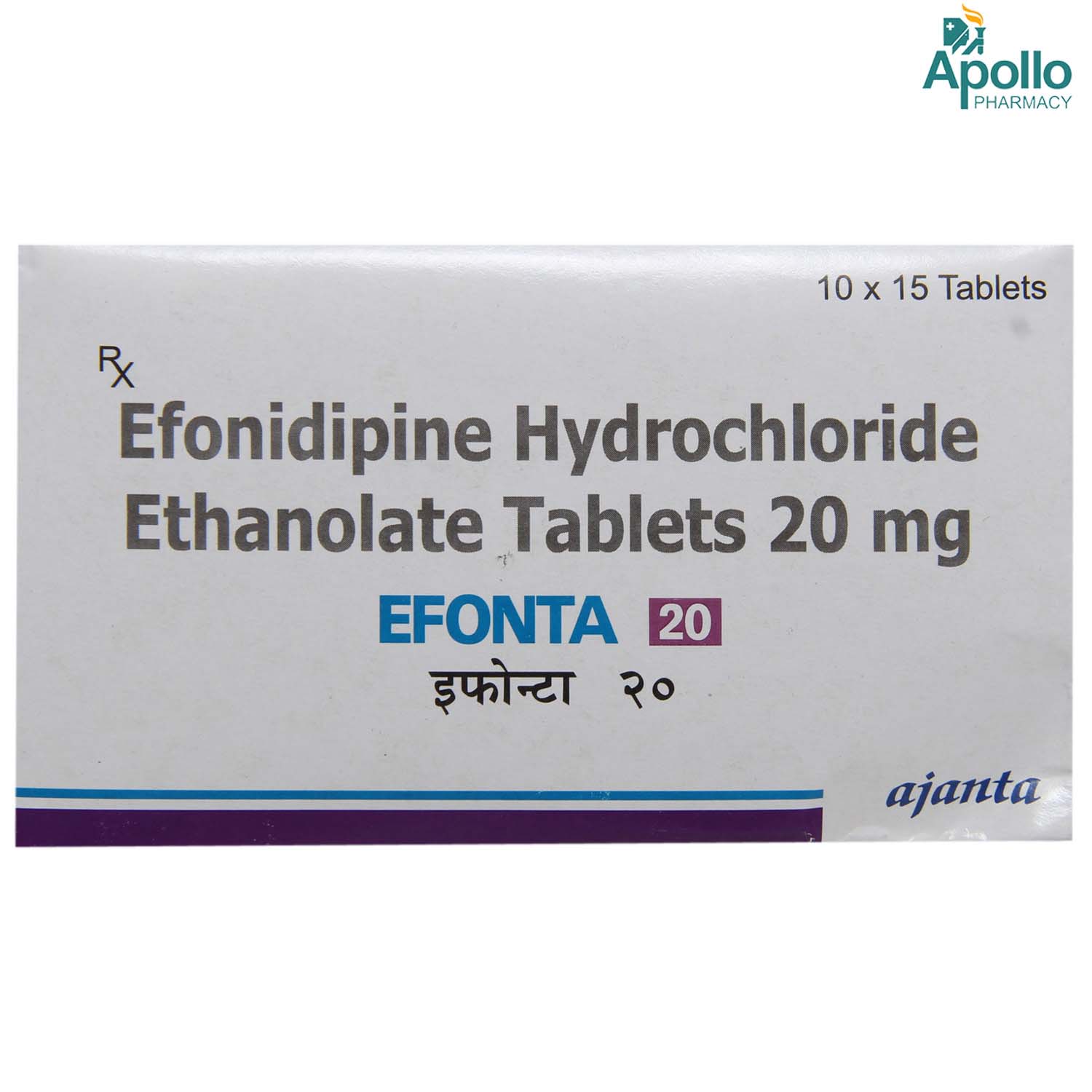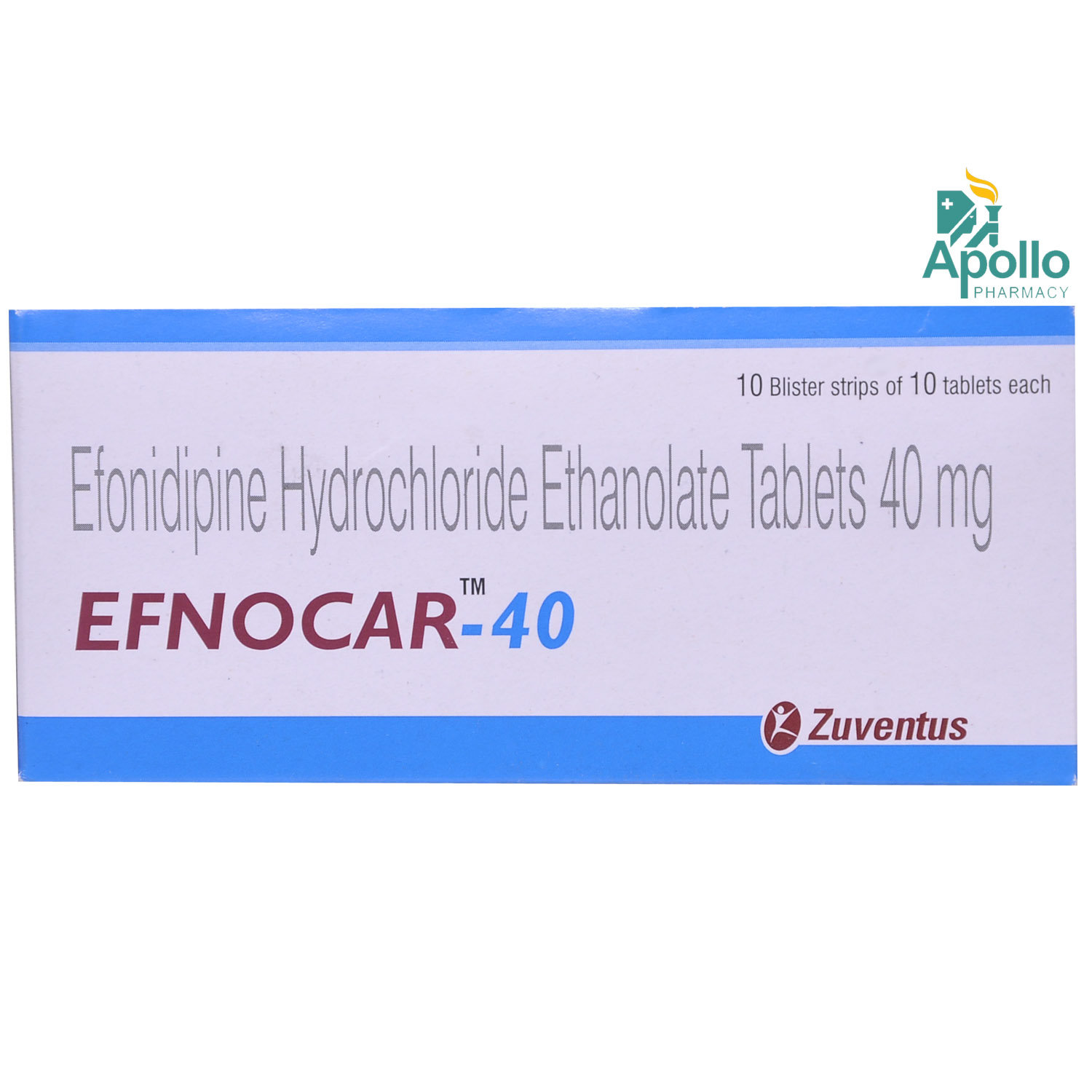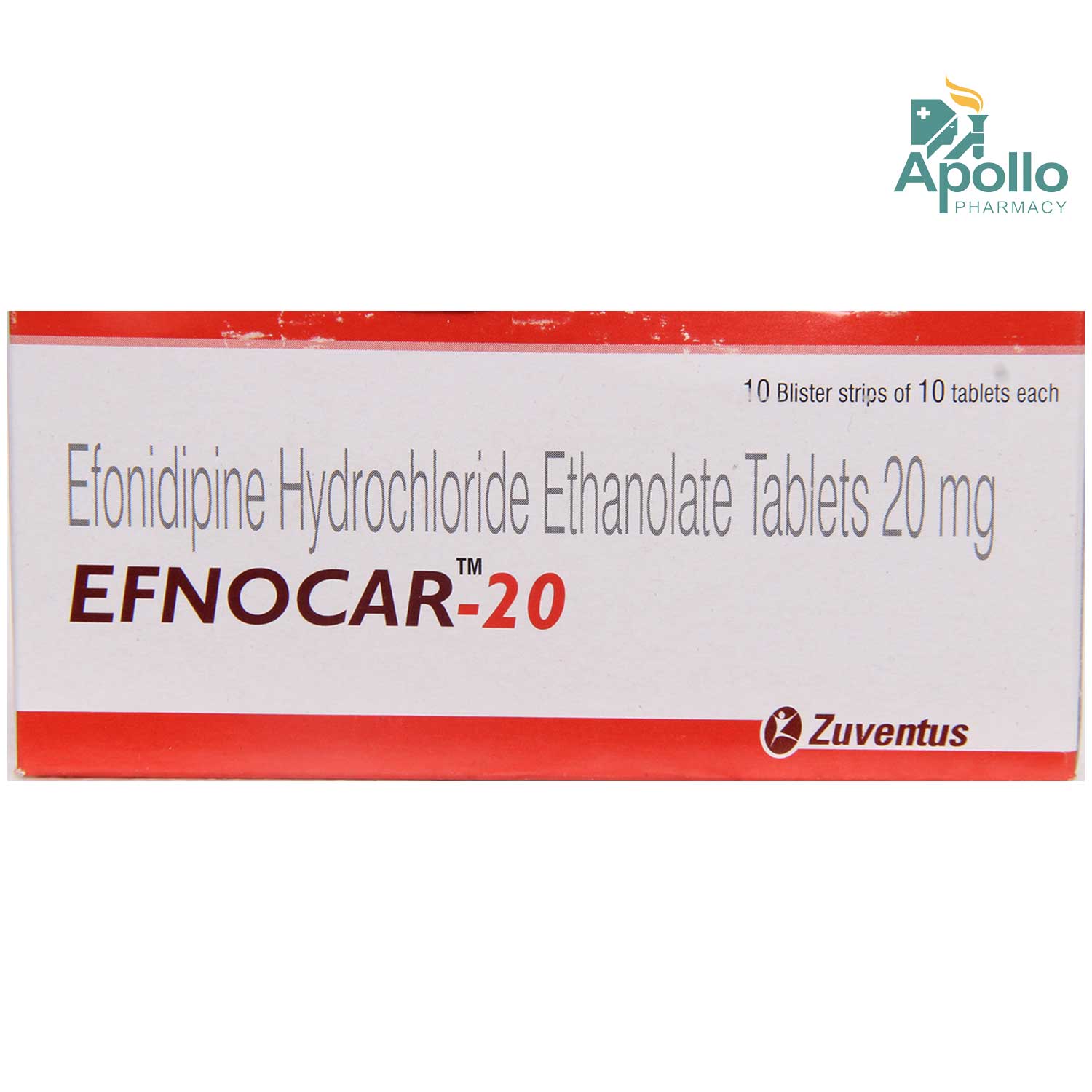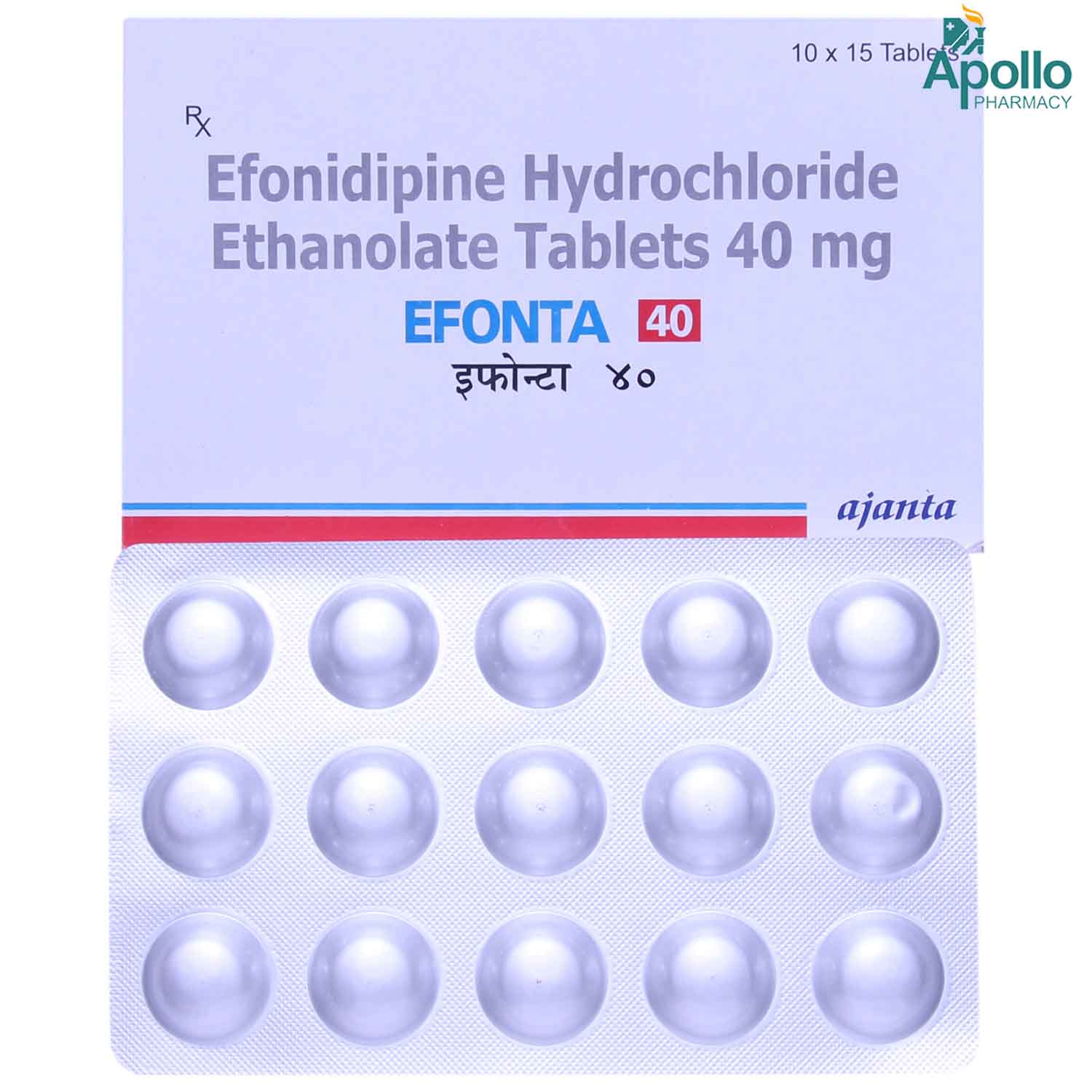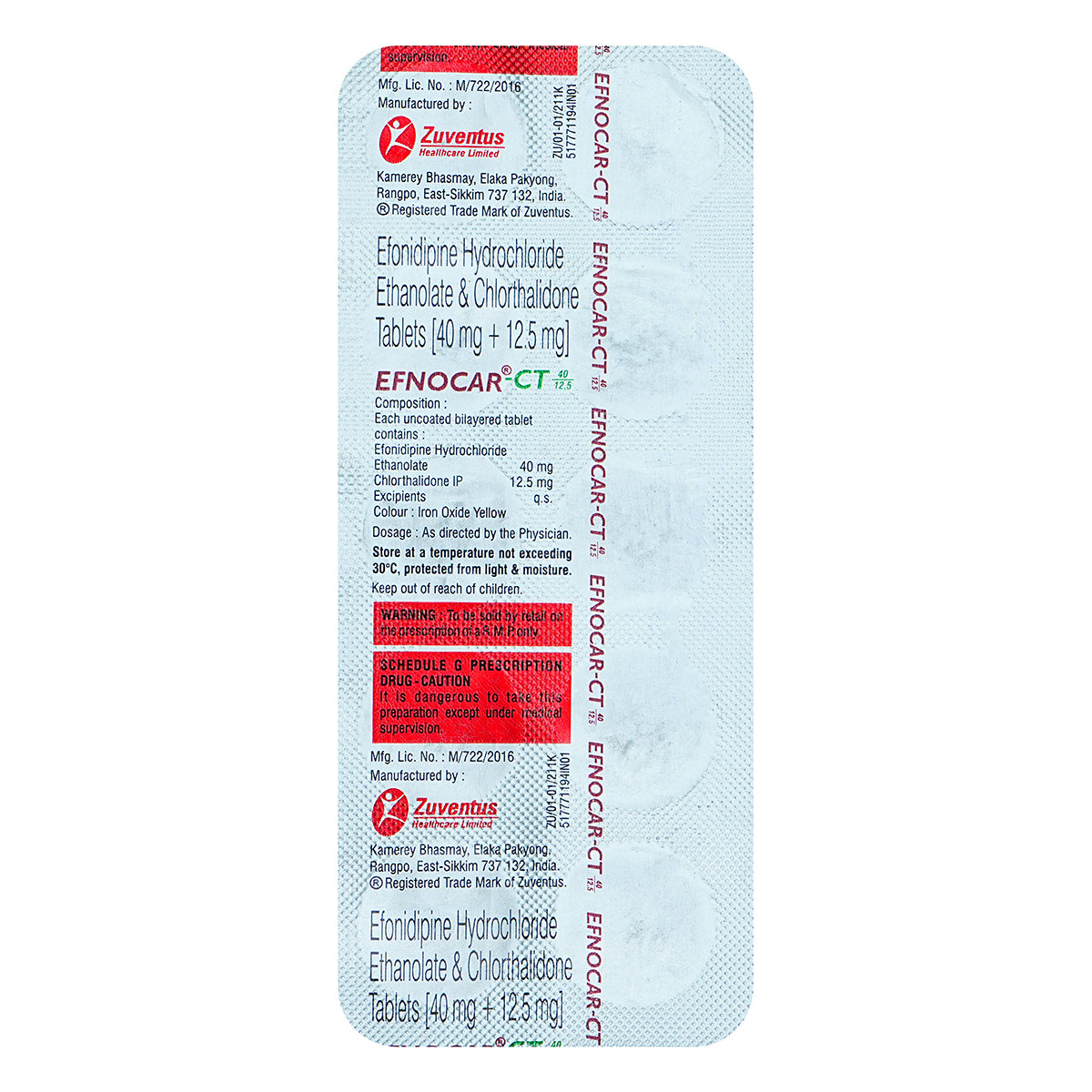Efonidipine
About Efonidipine
Efonidipine is used for the treatment of High blood pressure (hypertension), hypertension caused by kidney disease, and angina (chest pain). Hypertension (high blood pressure) is a lifelong or chronic condition in which the force exerted by the blood against the artery walls becomes high. The higher this blood pressure, the harder the heart has to pump.
Efonidipine contains the active substance efonidipine. In patients with high blood pressure, it works by relaxing blood vessels so that blood passes through them more easily. In patients with angina, it prevents chest pain by improving the blood supply to the heart muscle, which then receives more oxygen.
Take Efonidipine with or without food as your doctor prescribes with a full glass of water. Efonidipine may be specified alone or in combination with other blood pressure-lowering medicines, depending upon your blood pressure levels. Inform your doctor if you are taking any other antihypertensive medicine. You may have common side effects like headache, nausea, stomach discomfort, abdominal pain, hot flashes, palpitations, and facial flushing that usually resolve after some time. You must closely monitor your blood pressure if you have ever had a stroke or heart attack or are currently taking other blood pressure-lowering pills. It is advised to continue taking this drug and not stop taking it suddenly without consulting your doctor.
Please tell your doctor if you are allergic to Efonidipine or any other medicines. If you are pregnant or breastfeeding, you should consult a doctor before taking Efonidipine. Avoid drinking alcohol with Efonidipine as it may increase the risk of low blood pressure and cause adverse effects such as dizziness, fainting, light-headedness, or headache. Drive only if you are alert, as Efonidipine may cause dizziness or tiredness. Inform your doctor if you have had liver disease, kidney disease, heart failure, and a history of a heart attack.
Uses of Efonidipine
Medicinal Benefits
Efonidipine contains efonidipine, an antihypertensive and antianginal drug. It is used to lower blood pressure in patients with high blood pressure by relaxing blood vessels so that blood passes through them more easily. In patients with angina, it works by improving blood supply to the heart muscle, which then receives more oxygen, and as a result, chest pain is prevented.
Directions for Use
- Efonidipine can be taken with or without food, but avoid taking it with grapefruit or grapefruit juice.
- It is usually taken once daily, or as prescribed by your doctor.
- Swallow the whole Efonidipine with a glass of water.
- Do not crush, chew, or break it.
Storage
Side Effects of Efonidipine
- Hot flushes
- Palpitations
- Facial flushing
- Headache
Drug Warnings
Do not use Efonidipine if you are allergic to Efonidipine or its components. Please inform your doctor if you are using any prescription and non-prescription medications, including vitamins, before starting Efonidipine. Let your doctor know if you have any history of severe heart, kidney, or liver diseases. If you are pregnant or breastfeeding, think you may be pregnant, or plan to have a baby, ask your doctor for advice before taking this medicine. Efonidipine is not recommended in children and adolescents under 18 years due to a lack of information for this age group. You should not drink grapefruit juice or eat grapefruit while taking this medicine. Grapefruit and grapefruit juice can increase the blood levels of efonidipine, which can cause an unpredictable increase in its blood pressure-lowering effect.
Drug Interactions
Drug-Drug Interactions: Efonidipine may interact with other antihypertensive agents (blood pressure-lowering drugs), stomach acid reducers (cimetidine) and immunosuppressants (tacrolimus).
Drug-Food Interactions: Avoid drinking grapefruit juice or eating grapefruit while taking this medicine.
Drug-Disease Interactions: Efonidipine may interact with disease conditions, including liver disease, recent heart attack, heart failure, or severe increase in blood pressure (hypertensive crisis).
Drug-Drug Interactions Checker List:
Safety Advice

Alcohol
unsafeIt is unsafe to consume alcohol since it may worsen the side effects like dizziness and also increase blood pressure.

Pregnancy
cautionConsult your doctor, and there is no substantial research yet on the use of Efonidipine in Pregnant women.

Breast Feeding
cautionConsult your doctor, and there is no substantial research yet on the use of Efonidipine in breastfeeding/nursing mothers.

Driving
cautionDo not drive or operate machinery if you experience dizziness or drowsiness while using Efonidipine. Seek medical attention if the symptoms persist longer.

Liver
cautionConsult your doctor before taking Efonidipine if you have a liver impairment or any concerns regarding this. Your doctor will weigh the benefits and any potential risks before prescribing them to you.

Kidney
cautionConsult your doctor before taking Efonidipine if you have kidney impairment or any concerns regarding this. Your doctor will weigh the benefits and any potential risks before prescribing them to you.

Children
unsafeEfonidipine is not recommended in children and adolescents under 18 years due to a lack of information for this age group.
Habit Forming
Diet & Lifestyle Advise
Keep your weight under control with a BMI of 18.5-24.9.
Do regular physical activity or exercise for at least 150 minutes per week, or about 30 minutes most days of the week. Doing this can help lower your raised blood pressure by about 5 mm Hg.
Opt for a diet rich in whole grains, fruits, veggies, and low-fat dairy products.
Limit sodium chloride (table salt) intake in your daily diet.
If you are taking alcohol, only one serving for women and two servings for men is advisable.
Quitting smoking is the best strategy to lower the risk of heart disease.
Avoid chronic stress, as it can raise your blood pressure. Try to enjoy and spend time with your loved ones to cope with stress and practice mindfulness techniques.
Monitor your blood pressure daily and if there is too much fluctuation, immediately contact your doctor.
Try to include heart-healthy omega-3 fatty acid-containing food and drinks in your daily diet. You can also use low-fat cooking oil like olive oil, soybean oil, canola oil, and coconut oil, as they may help lower your blood pressure.
Special Advise
Monitor your blood pressure regularly and seek medical advice if you notice any drastic fluctuations.
Efonidipine may affect patients with hepatic impairment; hence, it is used cautiously, and Liver function monitoring and Liver Function Tests are advised to monitor the liver enzyme changes.
Your doctor may advise you to get a regular kidney function test and blood examinations for potassium levels and other electrolytes while using Efonidipine to rule out any renal impairment.
Grapefruit juice and grapefruit should not be consumed by people taking Efonidipine. This is because grapefruit and grapefruit juice can increase the blood levels of the active ingredient amlodipine in Efonidipine, which can cause an unpredictable increase in the blood pressure-lowering effect of Efonidipine.
Patients Concern
Disease/Condition Glossary
High blood pressure: Blood pressure measures the force our heart uses to pump blood to all body parts. Hypertension is a chronic condition when blood pressure is too high. This condition can lead to hardened arteries (blood vessels), decreasing the blood and oxygen flow to the heart. Raised blood pressure can cause chest pain (angina) and heart attack (when the blood supply to the heart is blocked). High blood pressure also causes brain damage (stroke) and kidney failure. High blood pressure can be diagnosed with the help of a blood pressure monitor. Systolic pressure is the pressure with which the heart pumps blood. On the other hand, diastolic pressure is the pressure when your heart is at the resting stage between heartbeats. If your blood pressure is 140/90 mm of Hg, it means the systolic pressure is 140 mm of Hg, and diastolic pressure is 90 mm of Hg. Ideal blood pressure should be between 90/60 mm of Hg and 120/80 mm of Hg.
FAQs
Efonidipine is used to treat high blood pressure (hypertension) and heart-related chest pain (angina).
In hypertension patients, Efonidipine works by relaxing blood vessels so that blood passes through them more easily. In patients with angina, it works by improving blood supply to the heart muscle, which then receives more oxygen, and as a result, chest pain is prevented.
You are recommended to use Efonidipine in dose and duration as advised by the doctor. Do not stop taking Efonidipine on your own as it may lead to a sudden rise in blood pressure and increase the risk of heart attack and stroke.
It's unlikely that Efonidipine affects fertility in men or women. However, there's not enough evidence to say for certain. For the best advice, consult your doctor.
High blood pressure during pregnancy is called Pregnancy-induced hypertension (PIH). It is harmful to both the baby and the mother. In the mother, very high blood pressure can cause seizures (fits), headache, swelling of feet, kidney damage and a higher risk of bleeding during pregnancy and during delivery. This can also affect the baby by causing an abnormal fetal heart rate of the baby and risk of stillbirth. So, during the pregnancy, you should have regular blood pressure monitoring. Visit your doctor if you have any concerns related to blood pressure during pregnancy.
You are not recommended to stop taking Efonidipine on your own. You are advised to inform your doctor and monitor your blood pressure for at least two weeks before stopping the medicine. Depending upon your current blood pressure readings, there is a possibility that your doctor may lower the dosage.
Yes, it is the common side effect of Efonidipine. Most of these side effects usually resolve after some time. Please consult your doctor if you have any concerns regarding this.
While taking Efonidipine, make healthy lifestyle choices to ensure its effectiveness. Maintain a healthy weight, exercise regularly, and eat whole grains, fruits, and vegetables. Limit sodium and alcohol intake, and quit smoking. Manage stress by spending time with loved ones and practicing mindfulness. Monitor your blood pressure daily and incorporate heart-healthy omega-3 fatty acids into your diet. Use low-fat cooking oils like olive oil and coconut oil. By making these changes, you'll support your overall heart health and benefit from the Efonidipine.
If your blood pressure drops too low after taking Efonidipine, call your doctor immediately. They may adjust your dose or switch you to a different medication. Keep checking your blood pressure regularly and drink plenty of water to stay hydrated. Be careful when standing up to avoid dizziness. Your doctor may need to make changes to your treatment plan to get your blood pressure back to normal level.
Please consult your doctor if you have any concerns regarding these. However, if you have existing kidney problems or take other medications that impact kidney function, be cautious. Your doctor will monitor your kidney health and adjust your treatment as needed to minimize risks.
Follow your doctor's instructions for the best time to take $ a name that suits your individual needs. Always best to consult your doctor to get suggestions about Efonidipine.
Generally, Efonidipine is taken for an extended period, potentially for the rest of your life, to maintain blood pressure control and reduce the risk of cardiovascular complications. Always follow your doctor's guidance on the duration of treatment. Do not stop taking Efonidipine without consulting your doctor, as sudden withdrawal can lead to a rebound increase in blood pressure.
No, it is not a beta-blocker. Efonidipine is a calcium channel blocker, it works by relaxing blood vessels.
The common side effects of Efonidipine include headache, nausea, stomach discomfort, abdominal pain, hot flashes, palpitations, and facial flushing that usually resolve after some time. If you feel uncomfortable with these, please consult your doctor.
Avoid consuming grapefruit or grapefruit juice while taking Efonidipine. This is because grapefruit can increase the medication levels in your blood, leading to an unpredictable drop in blood pressure. To stay safe, avoid grapefruit products and let your doctor know if you've had any recently. Limit high-sodium foods, alcohol, and over-exercise, especially in hot weather. Be cautious when standing up quickly, as this can cause dizziness.
If you experience swelling in your ankles or feet while taking Efonidipine, contact your doctor right away. They may adjust your medication, prescribe a water pill to reduce swelling, or recommend lifestyle changes like elevating your legs, reducing sodium intake, and increasing physical activity.



